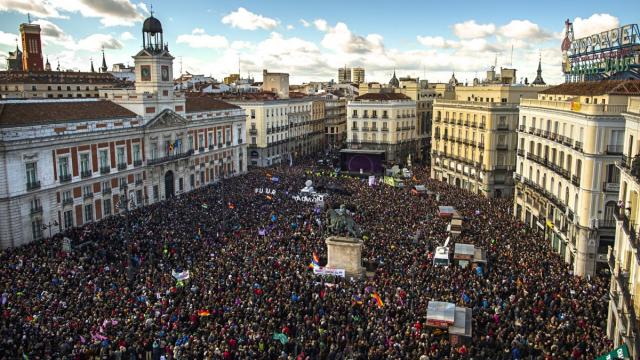
Four years ago, Madrid’s central Puerta del Sol square belonged to los indignados – an impromptu revolt of thousands, camping out for weeks and rallying against a political establishment felt to be out of sync with the people.
On Saturday, up to 100,000 people again filled the square, determined to show the world that 2015 would be the year that the change demanded by the indignados would come about.
Less than a week after Greece elected an aggressively anti-austerity government, the leaders of Spain’s own insurgent force, Podemos (We Can), urged supporters to take to the streets in a show of strength as it embarks on a tumultuous electoral campaign.
“Tick tock, tick tock,” chanted thousands as they occupied the broad avenues of central Madrid, counting down to a year packed with municipal, regional and general elections. Just a year since its creation, Podemos has vaulted to the top of opinion polls, threatening to bring an end to the bipartisan political system that has governed Spain since the death of General Francisco Franco in 1975.
“Greece gives us hope,” said Victor García, as he waved a large Greek flag in a sea of purple Podemos flags. “Things were going poorly there before. Now that the people have power, it can only get better,” said the 27-year-old doctor.
Led by ponytailed Pablo Iglesias, 36, the movement’s popularity has rocketed as Spaniards see themselves reflected in his message of a disconnect between the economic recovery touted by the governing People’s party and their daily lives. Pointing to persistent unemployment, evictions and growing inequality, Iglesias’s promises to reverse austerity and tackle corruption have struck a chord.
“The current situation has to change,” said Paloma Gómez. She attended the rally for the sake of her two children, both of whom had moved to Germany three years ago hoping to find work. “Our politicians are not just robbing us, they’re pushing our youth out of the country.”
More than 260 buses arrived in Madrid for the march, many paid for by a crowdfunding campaign. Hundreds of Madrileños opened their homes to travelers for the night, while others offered free rides back and forth across the country. “How could I not come for this?” asked Mari Henrahos, 67, who had left her small town in Alicante province before sunrise to drive to Madrid.
“We’re losing everything that we fought so hard for in the late 1970s. Spain is the fourth-largest economy in the eurozone, but now we’re also one of the most unequal.”
People want change, which is exactly what Podemos is offering, she said. Surrounded by a sea of banners advocating causes from public education and universal health care to the abolition of the monarchy and a guaranteed minimum income, she said she was confident Podemos could live up to expectations. “At the end, we’re all asking for the same thing: that the government acts in the best interests of its people.”
Podemos’s strength has come from its grassroots mobilization, with more than 1,000 groups that meet regularly across the country. It was this system that earned it five seats in the European parliament elections last May.
The first test of whether it can translate its grassroots movement into power in Spain will come with the Andalucian regional elections, due at the end of March. As it scrambles to set up a party structure in the region and articulate its platform, Pepa Jaén Jesus from Sevilla had little doubt that it would be successful.
“I have 27 nieces. Only two of them have jobs. The rest don’t have a penny coming in. Everybody can see that the current system isn’t working,” she said. Behind her, four people held up a banner reading “The joy will begin in Andalucia.”
Speaking from a purple stage set up in Puerta del Sol square, Iglesias urged people on Saturday to channel their frustrations into political change. “We dream, but we take our dreams seriously,” he said as he blasted growing inequality in Spain.
“Since the economic crisis the number of rich has increased by 27%. That’s the same number who now live at risk of poverty. Is this economic recovery?”
He said Podemos was offering – first and foremost – change. “They call it an experiment and chaos. We call it democracy.”
His voice rose as he said the Greek people had already won. “In Greece they did more in six days than many governments have done in many years.” But he cautioned those who argue that Syriza’s victory would pave the way for Podemos.
“We support our brothers but nobody did their homework for them and nobody will do our homework for us,” he said. In recent days the party has increased efforts to distance itself from Syriza, particularly after news emerged that no women had been appointed to Syriza’s senior cabinet.
On Saturday, supporters noted that Syriza had set an example, but that the time had come for Spaniards to focus attention inwards in search of a similar change. Attending the rally with a traditional band of Andean pan flutes and drums, Alejandro Cuarón said his group had come to the march to represent both Latin Americans and Spaniards.
“As Latin Americans we’ve lived through the inequality taking over Spain. We immigrated here to escape this – we’re exiles of this inequality, as well as corruption.”
But as they had embarked on their new lives in Spain, he said they had watched worriedly as the country had slowly changed. “There are three million empty houses, but yet there are people sleeping under bridges and in the streets. It’s shameful. It’s time for a transformation.”
3 WAYS TO SHOW YOUR SUPPORT
- Log in to post comments











